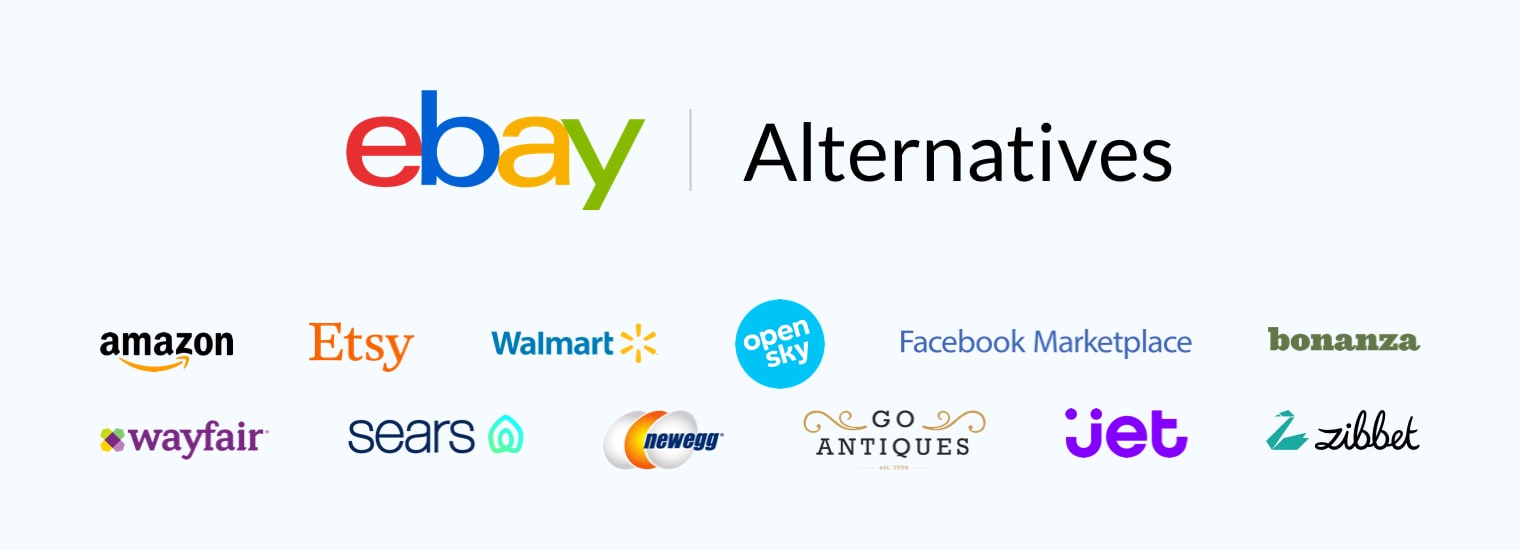Why You Should Consider Options Beyond eBay
For online sellers, eBay has long been a popular platform for buying and selling goods. However, with its high fees and intense competition, many sellers are looking for alternative marketplaces to expand their online sales. If you’re one of them, you’re not alone. In fact, many sellers are seeking sites similar to eBay for selling their products, and for good reason. With the rise of e-commerce, there are now numerous online marketplaces that offer lower fees, more personalized experiences, and access to niche audiences.
One of the main limitations of selling on eBay is its high fees. With insertion fees, final value fees, and PayPal fees, sellers can end up paying up to 15% of their sale price in fees alone. This can be a significant burden, especially for small businesses or individuals who are just starting out. In contrast, many alternative marketplaces offer lower fees, making it easier for sellers to keep more of their hard-earned profits.
Another limitation of eBay is its intense competition. With millions of active listings, it can be difficult for sellers to stand out and attract buyers. This can lead to lower sales and reduced visibility, making it harder for sellers to grow their businesses. Alternative marketplaces, on the other hand, often have less competition, making it easier for sellers to get noticed and build a loyal customer base.
So, if you’re looking for sites similar to eBay for selling your products, you’re in luck. There are numerous alternative marketplaces that offer lower fees, more personalized experiences, and access to niche audiences. In this article, we’ll explore some of the best options available, including Amazon, eBid, Rakuten, and more. Whether you’re a seasoned seller or just starting out, these marketplaces can help you expand your online sales and grow your business.
How to Choose the Best Platform for Your Products
With so many sites similar to eBay for selling, choosing the right platform for your products can be overwhelming. However, by considering a few key factors, you can make an informed decision that helps you reach your target audience and increase sales. One of the most important factors to consider is your target audience. Who are your ideal customers, and which platforms do they use? For example, if you’re selling handmade products, Etsy may be a great option. If you’re selling electronics, Amazon or eBay may be a better fit.
Another factor to consider is product categories. Different platforms specialize in different types of products, so it’s essential to choose a platform that aligns with your product offerings. For example, if you’re selling vintage items, Ruby Lane or eBay may be a good choice. If you’re selling new products, Amazon or Rakuten may be a better option.
Fees are also an essential consideration when choosing a platform. Different platforms charge different fees, and some may be more cost-effective than others. For example, eBid charges lower fees than eBay, making it a great option for sellers who want to keep more of their profits. Amazon, on the other hand, charges a flat fee per sale, which can be beneficial for sellers who want to predict their costs.
Finally, consider the level of competition on each platform. If you’re selling a unique or niche product, you may want to choose a platform with less competition. On the other hand, if you’re selling a popular product, you may want to choose a platform with more competition to increase your visibility.
By considering these factors, you can choose the best platform for your products and increase your chances of success. Whether you’re looking for sites similar to eBay for selling or want to explore new platforms, there are many options available. In the next section, we’ll explore one of the largest online marketplaces for sellers: Amazon.
Amazon: The Largest Online Marketplace for Sellers
Amazon is the largest online marketplace for sellers, with over 300 million active customers worldwide. As one of the most trusted brands in the world, Amazon offers a massive customer base and a wide range of tools and services to help sellers succeed. Whether you’re looking for sites similar to eBay for selling or want to expand your online sales, Amazon is definitely worth considering.
One of the main benefits of selling on Amazon is its massive customer base. With millions of customers shopping on the platform every day, you can reach a huge audience and increase your chances of making sales. Additionally, Amazon’s trusted brand and reputation for quality and customer service can help to build trust with your customers and increase your sales.
Another benefit of selling on Amazon is its wide range of tools and services. From Fulfillment by Amazon (FBA) to Amazon Advertising, the platform offers a range of features to help sellers manage their inventory, market their products, and provide excellent customer service. With FBA, for example, you can store your products in Amazon’s warehouses and let Amazon handle the shipping and customer service, freeing up more time for you to focus on growing your business.
To get started as an Amazon seller, you’ll need to create a professional seller account and set up your store. This involves providing some basic information about your business, such as your business name and address, and verifying your email address and phone number. You’ll also need to set up your product listings, which involves creating a title, description, and price for each product, as well as adding images and other relevant details.
Once you’ve set up your store and product listings, you can start selling on Amazon. You can use Amazon’s advertising tools to promote your products and reach a wider audience, and you can also use Amazon’s performance metrics to track your sales and optimize your listings for better performance.
eBid: A Smaller but Growing Alternative to eBay
eBid is a smaller but growing marketplace that offers a more personalized experience for buyers and sellers. As one of the sites similar to eBay for selling, eBid provides a platform for sellers to list their products and reach a targeted audience. With lower fees than eBay, eBid is an attractive option for sellers who want to keep more of their profits.
One of the benefits of selling on eBid is its more personalized experience. Unlike eBay, which can be overwhelming with millions of listings, eBid offers a more curated experience for buyers. This means that sellers can stand out more easily and connect with buyers who are genuinely interested in their products.
eBid also offers a range of features and tools to help sellers succeed. From customizable storefronts to advanced listing options, eBid provides sellers with the tools they need to showcase their products and attract buyers. Additionally, eBid’s customer service team is available to help sellers with any questions or concerns they may have.
To get started on eBid, sellers can create a free account and start listing their products. eBid offers a range of listing options, including fixed price and auction-style listings, so sellers can choose the format that works best for them. With eBid’s lower fees and more personalized experience, sellers can keep more of their profits and build a loyal customer base.
Overall, eBid is a great option for sellers who are looking for a smaller but growing marketplace to sell their products. With its lower fees, more personalized experience, and range of features and tools, eBid is definitely worth considering for sellers who want to expand their online sales.
Rakuten: A Global Marketplace with a Strong Focus on Customer Service
Rakuten is a global marketplace that offers a unique approach to customer service, setting it apart from other sites similar to eBay for selling. With a strong focus on building relationships between buyers and sellers, Rakuten provides a more personalized experience for its users. Founded in 1997, Rakuten has grown to become one of the largest online marketplaces in the world, with over 40,000 merchants and 18 million customers worldwide.
Rakuten’s business model is centered around its “Rakuten Ichiba” marketplace, which allows merchants to set up virtual stores and sell their products to a global audience. The platform offers a wide range of product categories, including electronics, fashion, home goods, and more. Rakuten also provides a range of tools and services to help merchants manage their stores and optimize their sales.
One of the key benefits of selling on Rakuten is its global reach. With a presence in over 29 countries, Rakuten provides merchants with access to a vast and diverse customer base. Additionally, Rakuten’s focus on customer service means that merchants can benefit from a range of support services, including customer support, payment processing, and logistics management.
To get started on Rakuten, merchants need to create a virtual store and list their products. Rakuten offers a range of listing options, including fixed-price and auction-style listings. Merchants can also take advantage of Rakuten’s marketing and promotional tools to help drive sales and increase visibility for their products.
While Rakuten’s fees are generally competitive with other marketplaces, they do vary depending on the type of product and the merchant’s location. However, with its strong focus on customer service and global reach, Rakuten is an attractive option for merchants looking to expand their online sales beyond eBay and other sites similar to eBay for selling.
Specialized Marketplaces for Niche Products
While general marketplaces like eBay and Amazon can be great for selling a wide range of products, specialized marketplaces can be a better fit for niche products. These platforms cater to specific interests and demographics, providing a targeted audience for sellers who specialize in unique or hard-to-find items.
For example, Etsy is a popular marketplace for handmade, vintage, and unique items. With over 90 million active buyers, Etsy provides a vast audience for sellers who specialize in crafts, jewelry, clothing, and home decor. Etsy’s focus on handmade and unique items also means that sellers can charge premium prices for their products, making it a lucrative option for those who specialize in niche products.
Another example is Ruby Lane, a marketplace that specializes in vintage and antique items. With a focus on high-end, unique items, Ruby Lane provides a platform for sellers who specialize in rare and collectible items. Ruby Lane’s audience is highly targeted, with buyers who are specifically looking for vintage and antique items, making it easier for sellers to connect with their target market.
Other specialized marketplaces include Redbubble for print-on-demand products, Zibbet for handmade and vintage items, and Bonanza for unique and eclectic items. These platforms provide a range of benefits for sellers, including targeted audiences, lower fees, and more personalized experiences.
When choosing a specialized marketplace, it’s essential to consider the fees, target audience, and product categories. Sellers should also research the platform’s policies and guidelines to ensure that their products comply with the marketplace’s rules. By choosing the right specialized marketplace, sellers can tap into a targeted audience and increase their sales.
Specialized marketplaces can also provide a competitive edge for sellers who are looking for alternatives to sites similar to eBay for selling. By focusing on a specific niche or demographic, sellers can differentiate themselves from larger marketplaces and connect with buyers who are specifically looking for their products.
Facebook Marketplace and Other Social Media Selling Options
Social media platforms have become an essential part of online selling, offering a range of opportunities for businesses to connect with customers and showcase their products. Facebook Marketplace, Instagram, and Pinterest are just a few examples of social media platforms that allow businesses to sell their products directly to customers.
Facebook Marketplace is a convenient platform for buying and selling items locally. With over 800 million monthly active users, Facebook Marketplace provides a vast audience for businesses to sell their products. The platform is free to use, and businesses can list their products in various categories, including electronics, clothing, and home goods.
Instagram is another popular social media platform for selling products. With over 1 billion active users, Instagram provides a visually-driven platform for businesses to showcase their products. Instagram Shopping allows businesses to tag their products in posts and stories, making it easy for customers to purchase from their feed.
Pinterest is a platform that is ideal for businesses that sell products that are visually appealing. With over 320 million active users, Pinterest provides a platform for businesses to showcase their products through high-quality images and videos. Pinterest Shopping allows businesses to add shopping tags to their pins, making it easy for customers to purchase from their feed.
While social media platforms offer a range of opportunities for businesses to sell their products, they also come with their own set of challenges. For example, businesses need to ensure that they comply with each platform’s policies and guidelines, and they need to be prepared to handle customer service inquiries and issues.
When selling on social media platforms, businesses should also consider the fees associated with each platform. For example, Facebook Marketplace does not charge any fees for buying or selling, while Instagram Shopping charges a fee of 5% on every sale.
Overall, social media platforms offer a range of opportunities for businesses to sell their products and reach a wider audience. By leveraging these platforms, businesses can increase their online sales and stay competitive in the market. For businesses looking for sites similar to eBay for selling, social media platforms are definitely worth considering.
By selling on social media platforms, businesses can also reach a more targeted audience. For example, businesses can use Instagram’s shopping feature to target customers who are interested in specific products or categories. This can help businesses to increase their sales and reach a more targeted audience.
Maximizing Your Sales Across Multiple Marketplaces
Selling on multiple marketplaces can be a great way to expand your online sales and reach a wider audience. However, managing and optimizing sales across multiple platforms can be challenging. In this section, we will provide tips on how to maximize your sales across multiple marketplaces, including strategies for inventory management and customer service.
One of the key challenges of selling on multiple marketplaces is managing inventory. To avoid overselling or underselling, it’s essential to keep track of your inventory levels across all platforms. Consider using inventory management software to help you keep track of your stock levels and automate the process of updating your listings.
Another challenge is providing excellent customer service across multiple platforms. To ensure that you provide consistent customer service, consider implementing a customer service strategy that includes responding to customer inquiries, resolving issues, and providing refunds or replacements when necessary.
When selling on multiple marketplaces, it’s also essential to optimize your listings for each platform. This includes using relevant keywords, high-quality images, and detailed product descriptions. Consider using a listing template to help you create consistent listings across all platforms.
In addition to optimizing your listings, consider using advertising and promotional tools to increase your visibility and drive sales. Many marketplaces offer advertising options, such as sponsored listings or display ads, that can help you reach a wider audience.
Finally, consider using analytics tools to track your sales and performance across multiple marketplaces. This will help you identify areas for improvement and make data-driven decisions to optimize your sales strategy.
By following these tips, you can maximize your sales across multiple marketplaces and reach a wider audience. Whether you’re selling on sites similar to eBay for selling or other online marketplaces, the key to success is to provide excellent customer service, optimize your listings, and use advertising and promotional tools to drive sales.
Remember, selling on multiple marketplaces requires a strategic approach to inventory management, customer service, and listing optimization. By implementing these strategies, you can increase your online sales and reach a wider audience.
In conclusion, maximizing your sales across multiple marketplaces requires a combination of effective inventory management, excellent customer service, and optimized listings. By following these tips, you can increase your online sales and reach a wider audience, whether you’re selling on sites similar to eBay for selling or other online marketplaces.






